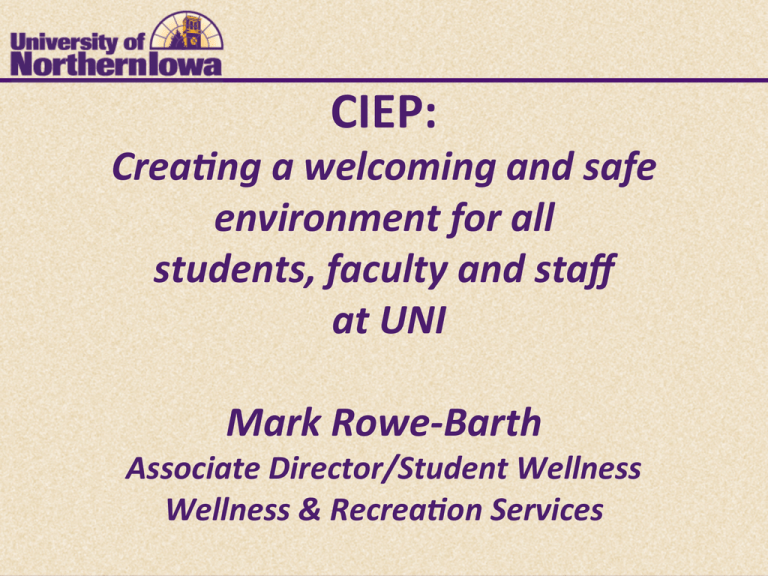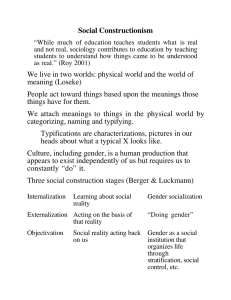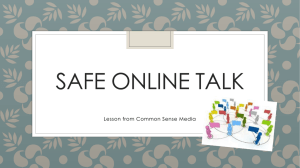Document 10761903
advertisement

CIEP: Crea%ng a welcoming and safe environment for all students, faculty and staff at UNI Mark Rowe-­‐Barth Associate Director/Student Wellness Wellness & Recrea%on Services Why are we here today? • Educa&on and Awareness: assump&on of good men and women, policy at UNI and laws in the United States • Clear Expecta&ons: what’s inappropriate behavior VS. what’s appropriate behavior • Safety: protec&ng yourself and others • Privilege Code of Student Conduct • WE are a community… these are our values: – Honest – Respect – Responsibility Honesty • Living a life of integrity is at the heart of what makes us good ci&zens, leaders, friends, and colleagues who share the common goal of building our community. Respect • A community that values respect supports the rights of individuals to live and work with others in a safe environment that reflects the educa&onal ideals of the University. Responsibility • Students are expected to engage in responsible social conduct that reflects posi&vely upon the University community and to model good ci&zenship in any community. Inappropriate Behavior • Remember, the inappropriate behavior discussed in the following slides is against UNI policy and against the law in the United States. Inappropriate Behavior (conAnued) • Harassment: Harassment occurs when unwelcome conduct based on an individual’s membership in a protected group (i.e. sex, religion, sexual orienta&on, etc.) unreasonably interferes with the individual’s academic environment. • Example: Small group assignment; 3 men and 1 woman in group; men tell woman she must do all of the work. Inappropriate Behavior (conAnued) • Sexual Harassment: unwelcome sexual advances, requests for sexual favors, and other verbal, wriTen or physical conduct of a sexual nature. Inappropriate Behavior (conAnued) • Examples of Sexual Harassment: – spreading sexual rumors ~ catcalls or whistles ~ making sexual gestures ~ exposing genitalia and/or touching oneself sexually in front of another ~ repeated and unwelcome sexual conversa&ons ~ unwelcome and persistent flir&ng or teasing ~ persistent efforts to develop a sexual rela&onship ~ pressure to engage in sexual behavior ~ other verbal or physical conduct that could be construed as sexually based. Inappropriate Behavior (conAnued) • Stalking: inten&onal and repeated behaviors that place an individual in reasonable fear for his or her safety. Inappropriate Behavior (conAnued) • Examples of Stalking: – Follow you and show up wherever you are ~ Repeatedly call you, including hang ups ~ Damage your home, car, or other property ~ Send unwanted giZs, leTers, cards, or emails ~ Monitor your phone calls or computer use ~ Threaten you or someone close to you ~ Drive by or hang out at your home, school, or work ~ Repeatedly show up for no legi&mate purpose at places where you are ~ Other ac&ons that control, track, or frighten you. Inappropriate Behavior (conAnued) • Rela%onship Violence: a paTern of coercive, threatening, and violent behaviors aimed at gaining power and control over an in&mate/ da&ng partner. Inappropriate Behavior (conAnued) • Examples of Rela%onship Violence: – Name calling ~ Humilia&on ~ Controlling what the other person does, who they see, who they talk to ~ Hi^ng, pushing, choking, causing bodily injury ~ Denying access to money ~ Making other person afraid by smashing things, gestures, displaying weapons, hur&ng children. Inappropriate Behavior (conAnued) • Sexual Misconduct: represents a con&nuum of conduct from forcible rape and sexual assault to nonphysical forms of pressure that compel individuals to engage in sexual ac&vity against their will. It includes any physical contact of a sexual nature that is commiTed either by force, coercion, in&mida&on, or manipula&on or through the use of a person’s mental or physical incapacity, including incapacita&on caused by the use of drugs or alcohol. Inappropriate Behavior (conAnued) • Examples of Sexual Misconduct: – Non-­‐consensual touching of the genitals, buTocks, or breasts that is inten&onal or other non-­‐consensual and inten&onal touching or groping – Forcing/coercing someone to touch you or someone else in a sexual manner – Threatening to sexually harm someone – Rape or aTempted rape or other non-­‐consensual penetra&on of an orifice (anal, vaginal, oral) with the penis, finger or objects Inappropriate Behavior (conAnued) • Examples of Sexual Misconduct (con%nued): – Ignoring a sexual limit that has been communicated – Ini&a&ng sexual ac&vity with a person who is unable to provide consent due to incapacita&on from alcohol and/or drug consump&on or other condi&on – Coercing, in&mida&ng, or manipula&ng someone into sexual behavior – Using electronic devices or technology (e.g., cell phone, camera, email, Internet site or online community) to record or transmit nudity or sexual acts of another person without the person’s knowledge and consent Appropriate Behavior • At UNI and in the United States, we are working to create a culture which values: – Respect – Boundaries – Affirma&ve Consent – Collabora&on and Partnership Appropriate Behavior (conAnued) • Respect: listening, being understanding, valuing other person’s opinions and feelings, suppor&ng other person’s goals, choice of friends and ac&vi&es. Appropriate Behavior (conAnued) • Boundaries: talking and ac&ng so that the other person feels safe and comfortable, communica&ng openly and truthfully, accep&ng responsibility for self, admi^ng when you’re wrong. Appropriate Behavior (conAnued) • Affirma%ve Consent: – Asking permission and respec&ng the answer the first &me. – ONLY A VERBAL “YES” MEANS “YES.” “NO” MEANS “NO.” “SILENCE” DOES NOT MEAN “YES.” Appropriate Behavior (conAnued) • Collabora%on and Partnership: shared responsibility, mutually agreeing on a fair distribu&on of work, making decisions together, accep&ng change, being willing to compromise, seeking mutually sa&sfying resolu&ons to conflict. 2-­‐Word Summary • Welcome • Unwelcome Scenarios • Appropriate OR Inappropriate? Scenario 1 • You like one of your classmates. You each consider each other a friend. You buy your classmate an expensive giZ. You present the giZ to the classmate, saying: “I really like you and bought you this giZ.” Your classmate says: “Thank you, I appreciate your thoughhulness, but I cannot accept this giZ – I would just like to be friends.” You respond by saying: “I understand, appreciate your honesty, and yes, we can just be friends.” Scenario 2 • You are at a CIEP social func&on. There is a student you are aTracted to. You and some of your friends are all staring at this classmate, laughing and discussing the classmate’s buTock. Later, as you are walking by the classmate, you grab his/her buTock. Scenario 3 • You are studying in Maucker Union. You see a student from your class studying there as well and you keep watching this classmate. You move to a table that’s closer to the classmate. The classmate gets up to leave. You follow the classmate down to the computer lab where he/ she sits down at a computer. You sit next to him/ her. The classmate gets up to leave. You follow him/her back upstairs to the Coffeehouse. Scenario 4 • You arrive for your first day of CIEP class. When you see your instructor, you are surprised, as the instructor is not the gender or na&onality that you expected. When the instructor welcomes you, you respond rudely. During class that day, your behavior toward the instructor is disrespechul and disrup&ve to the classroom learning environment. BROTHER’S KEEPER, SISTER’S KEEPER Stages of Bystander Behavior: – NoAce the event – Interpret it as a problem – Feel responsible for dealing with it – Possess the necessary skills to act 2010,Berkowitz, Response Ability… On Campus BE SAFE • Don't walk alone, always walk in a group or with a friend. If you do not have someone with whom to walk, contact the UNI Safety Escort. • Choose well-­‐lighted paths, avoid shortcuts. • Be Aware! Find emergency phones if you need help. • Don't give your name or your telephone number to strangers. • If you carry cash, don't flash it. In The Residence Halls • • • • • • • Never loan or give your room keys to anyone. Don't block open residence hall doors! You never know who may enter, it is dangerous to you and everyone else in the building. Don't leave your room or go to sleep with your door unlocked. If you live on the ground floor of the dorms, lock your windows when you leave. If you are on an elevator with someone who makes you feel uncomfortable, exit as soon as possible. Don't take any unnecessary risks. Report the loss of your keys immediately. UNI Police (3-­‐2712) has a lost and found, they may be here. If you believe safety is being compromised in your building, tell your RA or Hall Coordinator. VicAm Advocate • Provides help and support to someone who is or has been or is afraid of being harmed by someone else. • Provides op&ons for repor&ng • Provides resources for follow-­‐up care • Email: joan.thompson@uni.edu (319) 273-­‐2137 Thank you! • It was wonderful to meet you today. • Enjoy your CIEP experience at UNI! Mark Rowe-­‐Barth Wellness & Recrea&on Center, Room 104 319-­‐273-­‐3423





